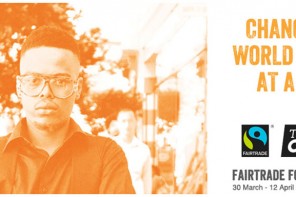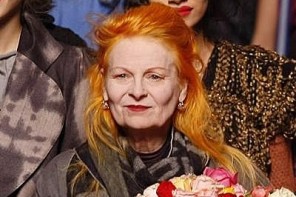The fashion industry is glamorous and beautiful – but it’s also cut-throat and hard. Especially for eco designers who are trying to get their collections noticed while simultaneously being conscious about the effect of the clothing industry on the planet. liveeco takes a look at some of the up-and-coming eco designers that we are going to keep an eye on!
London Fashion Week 2011
For the tenth season, the eco branch of London Fashion Week – called Esthetica – was launched in order to showcase up and coming designers who have the ability to change your wardrobe and your world.
London Fashion Week took place on 18 – 22 February and twenty two designers showcased their latest sustainable ranges at Esthetica (which was sponsored by Monsoon). Five of these designers, namely Christopher Raeburn, From Somewhere, Junky Styling, Lu Flux and The North Circular, are up-and-coming ethical designers that received mentoring and support from the British Fashion Council (BFC). This mentoring and support included product advice by industry experts such as Yasmin Sewell, Susanne Tide Frater and Bev Mailk.
“The BFC is delighted that designers now showcased in Esthetica are now seen alongside mainstream collections in leading retailers worldwide,” reads a statement on the London Fashion Week website.
Christopher Raeburn
Christopher Raeburn is a young British fashion designer who graduated from the Royal College of Art. Raeburn uses re-appropriated military fabrics to create functional and intelligent garments. This young designer drew inspiration from the 1920s camouflage grading that was applied to battleships in order to confuse the enemy through rapid patterns and changing colours.
Raeburn’s collection was highlighted for their extreme attention to detail and are branded as “proudly remade in England” and produced in East London.
The North Circular
Alice Ashby and Katherine Poulton are a duo that creates casual, yet classic knitwear “with a twist”. Ashby studied knitwear design at Central Saint Martins while Poulton modelled for big names in the fashion industry such as Luella and Mulberry.
The North Circular range focuses on ethically sourced cotton and hand-knitted accessories. On the designer’s website, you can even meet the “knitters” and the “sheep” behind their garments.
Lu Flux
London-based Lu Flux completed her studies at Edingburgh College of Art in 2006 and started out by doing odd commission work and temp work. After organising a show at a local gallery, Flux decided to fully commit herself and make a sustainable clothing collection.
Flux’s eco collection at the London Fashion Week combines traditional techniques, such as knitting, patchwork and pleating, with vintage and organic fabrics to create contemporary collections.
Why young designers get into eco fashion
In an interview with iStylista.com, Flux explained how the eco side of her fashion collection came about: “I look at myself as a fashion designer first, and being eco is a plus point of what I do. It´s not the sole purpose of why I am doing this. I do it because I have a passion for the environment, so I think I’m trying to be as environmentally friendly as I can, really, and I have always collected fabrics,” explains Flux.
“I have always loved car booting, charity shops. I collect and find things I like and I keep them, and I surround myself with all these quirky lovely things. And when I was doing my degree, it was getting to the point where it was just a bit ridiculous, the amount of clothes and fabrics wasted, and I had all these things, so I tried to use them within my work and that kind of led on to me going the whole hog with the environmental aspect of my clothing,” said Flux.
The dilemma for up-and-coming designers
Flux says that the eco or ethical legs of fashion shows are still often avoided and that it remains hard for a designer to market his or her clothes as “recycled”, due to the “second hand” stigma that many people still have about ethical or re-used clothing.
“I recently showed at Esthetica, the ethical part of London Fashion Week, and it almost gets avoided by a lot of people because they don’t see ethical fashion as being worthy of…well…fashion,” says Flux.
“It is really hard because there are a lot of designers that are trying to do what I am doing, which is just fashion first and being ethical second, but especially when I use my recycled fabrics as well, there is that kind of snobbery where, if you call it recycled, people see it as dirty, but they will happily wear vintage. If you call it vintage it sounds more appealing to people,” says Flux.
Karla Zens, a San Fransisco-based eco-fasion guru that specialises in thrift store styles, says the economic downturn has helped people move away from the “thrift store cooties” stigma and learn to love pre-owned designer merchanise.
Zens explains that low-priced garments (such as a cheap t-shirt) start out as cotton in a pesticide-laden field, before it is shipped to China, woven by children and shipped back. “And even your sweat-shop free, organic, vegetable dyed, carbon offset garment has consumed energy,” says Zens.
“Comparatively, no energy is spent to create a second-hand item. If you purchase a shirt from a thrift store, you’re basically saving it from a landfill. If you think thrift stores are home to nothing but pilled sweaters and 1980´s prom dresses, think again. You may have to weed through a lot of fashion crimes, but you will find amazing designer clothing that looks like it´s never been worn – and quite often, it hasn´t,” concludes Zens.
While not all of us are pro-thrift store shopping, the new and innovative ranges from established as well as up-and-coming designers are enough reason to give recycled clothing some face time. Be sure to check out the ethical fashion sections of the many international fashion shows held around the world this year!
The liveeco team







